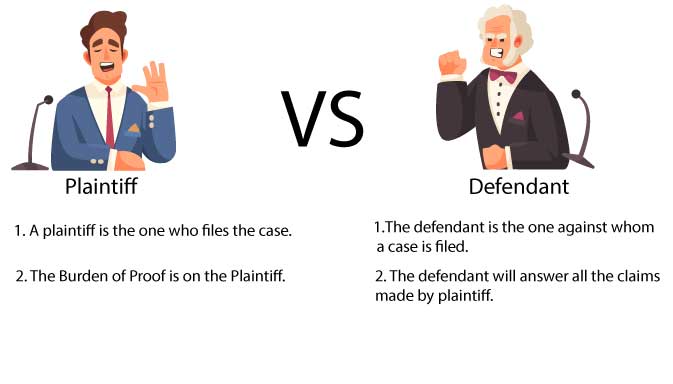Lawyers or law students are often mocked because of the difficult use of Legal Terms. To laymen, all the legal terms lawyers use are like a foreign language. Even these difficult terms have a technical term called Legalese or Legal Jargon.
In this article, we will talk about who is a plaintiff and who is a defendant in civil cases, the meaning of these two and the differences between these two legal terms.
Meaning of Plaintiff
A plaintiff is a person who files a lawsuit. Anyone can be a plaintiff. It doesn’t matter that the person has to be the victim. Oftentimes, the plaintiff and the victim are mixed together. It is up to the court to decide who is the victim and who is entitled to something. Plaintiff can be an individual, group of people or association. In divorce cases, the person filing the case is called Petitioner. In the case of Bankruptcy cases, both of these terms aren’t used. The person who files the case is called The Debtor and the person against whom the bankruptcy case is filed is called The Creditor. This is an exception.
But in criminal cases, the person who files a case is called a complainant. Some of the civil cases involve personal injury cases, breach of contract, fraud, divorce, child support cases, etc. Some of the criminal cases are murder, assault, sexual assault, identity theft, etc.
The first thing a plaintiff does is draft a complaint and file it in court. It is the very first document of a case.
Meaning of Defendants
A defendant is a person against whom a lawsuit has been filed. The document previously filed by the plaintiff is sent to the defendant. This is called summon. In summon, the complaint copy of the person who filed the lawsuit and specific requirements for the defendant to respond is attached.
The term plaintiff changes according to cases whether it is civil or criminal. But both in civil and criminal cases, the person against whom a lawsuit is filed is called the defendant.
Example of Plaintiff and Defendant
If you are still confused, then this example might help you.
Suppose, You (Tyler) and your friend (John) have a business. Your friend John started doing some fraudulent activities in the course of business. Now you want to sue John. The first thing you should do is draft a lawsuit and file it in court. Here you will be the plaintiff and John will be the defendant.
Here’s another scenario. Let’s say your wife is Laurie. She filed a divorce case against you. In this case, your wife is the plaintiff and you are the defendant. Sometimes, your wife might be referred to as Petitioner and you are the respondent. A divorce case is an exception.
Burden of Proof
One of the main differences between the two terms is that the burden of proof is always on the plaintiff. In the above-mentioned scenario, you (Tyler) should prove the fraudulent activities done by John in the course of business. You need to submit all the documents or evidence which will prove that John was doing fraudulent activities in the course of business. The reason behind this is to reduce false allegations. If the burden was on the defendant, then there will be numerous or a plethora of cases that will eventually make the justice system less feasible.
Differences Between Plaintiff and Defendant
- The very difference is that a plaintiff sues and a defendant is being sued.
- The burden of proof is on the Plaintiff.
- Usually, the name of the defendant is asserted last in a case. For example, John Doe v. Board of Education of Kansas. Here, John Doe is the plaintiff and the Board of Education of Kansas is the defendant.
- The sole purpose of the plaintiff is to prove his/her case and the defendant’s job is to defend the accusations bought by the plaintiff. Also, the defendant can put a counterclaim.

Other Terms
Here are a few other terms that are related to a case.
Appeals: When a case is appealed both the term Plaintiff and Defendant are hardly used. In appeal both the terms changed. The person who appeals in the higher court is called an Appellant regardless of whether he was the plaintiff or defendant and the other party is called Appellee.
Counterclaim: When a defendant is sued, he can claim against the plaintiff as well. For example, Walter sues Jesse for $500. Now Jesse can claim that he has already paid Walter $400. This is called a counterclaim.
- What is Mens Rea and Actus Reus - February 13, 2024
- Case Summary of Anglo Norwegian Fisheries Case | United Kingdom V Norway - April 7, 2023
- What is a Solicitor? How to Become One - January 9, 2023

